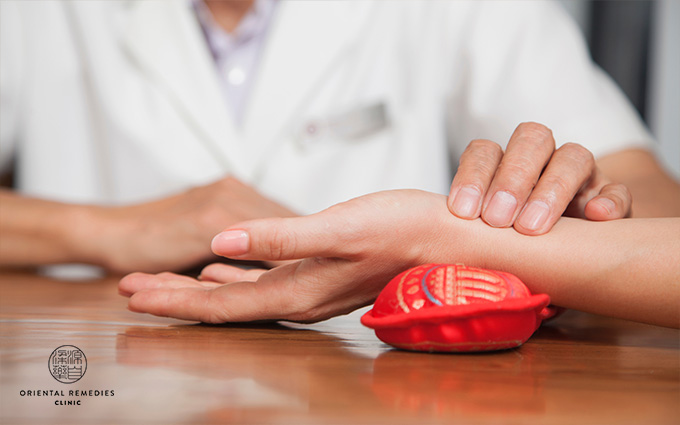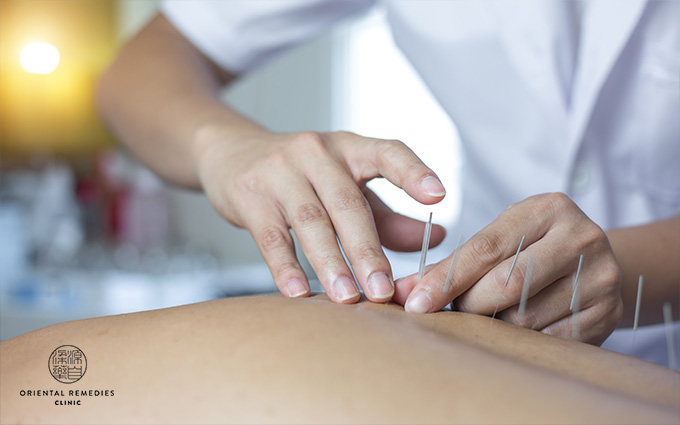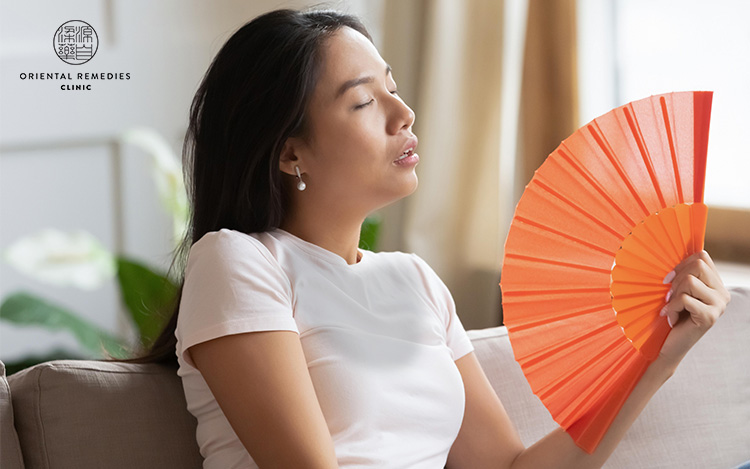Hot flashes are one of the most common and often uncomfortable symptoms of menopause, affecting many women as they transition through this stage of life. These sudden waves of intense heat, often accompanied by sweating, can feel overwhelming and sometimes even cause emotional distress.
If you are seeking relief, it is important to understand what causes hot flashes and explore the treatment options available. In this article, we will take a closer look at what triggers hot flashes, their symptoms, and how Traditional Chinese Medicine (TCM) can help you manage them naturally.
What Causes Hot Flashes?
Hot flashes are most commonly linked to hormonal changes, but other factors can also contribute to their occurrence. Understanding these causes can help you find the right treatment for menopause relief.
-
Hormonal Changes During Menopause and Perimenopause
The most common cause of hot flashes is hormonal changes[1], especially the drop in oestrogen levels during menopause. As women approach perimenopause and menopause, their bodies go through significant shifts in hormone production. Oestrogen, which plays a key role in regulating body temperature, declines, which can lead to the body struggling to control heat. This often results in hot flashes, which can increase in frequency and intensity before gradually settling down over time.
-
Medications
Certain medications can also induce hot flashes as a side effect. For example, some individuals on selective oestrogen receptor modulators (SERMs) like tamoxifen and raloxifine tend to experience hot flashes[2]. If you are experiencing hot flashes while on medication, it may be worth talking to your physician about possible alternatives.
-
Medical Conditions
Certain medical conditions can make hot flashes worse. For example, hyperthyroidism can cause the thyroid to overproduce hormones, leading to symptoms like excessive sweating, heat intolerance, and hot flashes[3].
How TCM Treatment Can Help

If you’re looking for natural remedies for your hot flashes, Traditional Chinese Medicine (TCM) could be the solution. Rather than merely relieving the symptom, TCM addresses the root imbalances in the body, offering a more holistic approach.
Here’s how TCM can contribute to the treatment of hot flashes:
-
Herbal Medicine
In TCM, herbal therapy is often used to address hormonal imbalances and help regulate body temperature. Herbs such as Chinese Angelica (当归), Szechwan Lovage Rhizome (川芎), Rehmanniae Radix Praeparata (熟地黄), and Chinese Dodder Seed (菟丝子) are commonly used for menopause symptoms and hormonal balance treatment. These herbs work by:
- Tonifying Yang
- Strengthening the body’s Qi
- Replenishing Kidney Yin
- Regulating the Liver
Together, they help restore the body’s internal balance and support overall well-being.
-
Acupuncture

Acupuncture is widely used in TCM to manage hot flashes and other symptoms. Fine needles are inserted at specific meridian points to stimulate the flow of Qi (energy) throughout the body. This process aims to help balance internal energy and regulate hormonal fluctuations. In fact, studies suggest that regular sessions of acupuncture for menopause may help reduce the severity and frequency of vasomotor symptoms [4], such as hot flashes and night sweats.
-
Cupping and Gua Sha
Both Cupping and Gua Sha are traditional TCM techniques that promote blood circulation and enhance Qi flow. Cupping involves placing suction cups on specific areas of the body, drawing blood to the surface. On the other hand, Gua Sha uses a smooth-edged tool to scrape the skin in long, firm strokes, stimulating microcirculation and lymphatic drainage. These techniques promote blood and Qi circulation, which can aid in the regulation of body temperature and ease symptoms like hot flashes.
-
Ear Acupressure (Ear Seeds)
Ear acupressure involves placing tiny seeds on specific acupoints on the ear that correspond to hormone-regulating areas of the body. This method provides continuous, gentle stimulation and may help support hormonal balance naturally over time.
-
Electro-Lymphatic Therapy (ELT)
In addition to acupuncture and herbal remedies, ELT is one of the complementary services available at Oriental Remedies Clinic to support TCM treatments for hot flashes. This non-invasive technique uses an FDA-registered machine to stimulate lymphatic drainage. By enhancing lymphatic circulation, ELT supports circulation and helps with detoxification, which in turn can help the body respond more effectively to hormonal changes and reduce hot flashes.
-
Cell Pro Therapy (CPT)
CPT is a gentle treatment that delivers high concentrations of Negative Ions to the body through plates placed at various points. This process helps support healthy blood circulation and promotes the natural production of serotonin[5], commonly known as the body’s “feel-good” hormone. Through improved circulation and enhanced serotonin levels, CPT may help regulate body temperature, balance mood, and ease stress during hormonal changes.
Exploring TCM for Women’s Health in Singapore
Are you looking for a more natural treatment for hot flashes and other menopausal symptoms like mood swings, sleep disturbances, and night sweats? TCM offers a holistic option that looks beyond just the symptoms. TCM care for menopause focuses on supporting the body’s internal balance, helping you move towards a healthier, more balanced version of yourself during and beyond this important life stage.
At Oriental Remedies Clinic, our physicians collaborate closely with you to develop a personalised treatment plan tailored to your needs. Our approach to TCM for women’s health combines time-honoured remedies with modern technology, supporting your body’s natural balance and empowering you to take control of your well-being.
Contact us today to find out more.
—
This article is written by Physician Kelly Wong, registered TCM physicians certified by the Traditional Chinese Medicine Practitioners Board (TCMPB).

Note: all words in Italics mentioned henceforth refer to the TCM organ system and not the anatomical organs/terms referenced in Western medicine.
Disclaimer:
The content on this page is for information and educational purposes only. Such medical information may relate to disease, injury, drugs and other treatments, medical devices and/or health products. Medical information does not amount to advice, and if advice is needed an appropriate professional help should be sought. The disclaimer asserts that no warranties or representations are given in respect of the medical information, and that the website operator should not be held liable if a user suffers any injury or loss after relying upon the medical information.
Any devices used for technology-enhanced therapies are intended for use only for general well-being purposes or to encourage or maintain a healthy lifestyle, and is not intended to be used for any medical purpose (such as the detection. diagnosis, monitoring, management or treatment of any medical condition or disease). Any health-related information provided by this device or software should not be treated as medical advice.
References:
[1] https://www.webmd.com/menopause/menopause-hot-flashes
[2] Sideras K, Loprinzi CL. Nonhormonal management of hot flashes for women on risk reduction therapy. Journal of the National Comprehensive Cancer Network. 2010;8(10):1171-1179. doi:10.6004/jnccn.2010.0086
[3] Yadav M, Kose V, Bhalerao A. Frequency of thyroid disorder in pre- and postmenopausal women and its association with menopausal symptoms. Cureus. June 2023. doi:10.7759/cureus.40900
[4] Avis NE, Coeytaux RR, Isom S, Prevette K, Morgan T. Acupuncture in Menopause (AIM) study: a pragmatic, randomized controlled trial. The Journal of the North American Menopause Society. 2016;23(6):626-637. doi:10.1097/gme.0000000000000597
[5] Perez V, Alexander DD, Bailey WH. Air ions and mood outcomes: a review and meta-analysis. BMC Psychiatry. 2013;13:29. Published 2013 Jan 15. doi:10.1186/1471-244X-13-29

